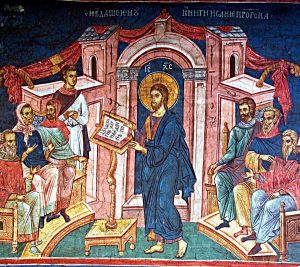 We call this the “Church” New Year, but it was, of course, the civil New Year of the Byzanrine Emperor. The book, Mapping Time, by E. G. Richards, says, “In AD 312 Constantine had instituted a 15-year cycle of indications (censuses of people’s ability to pay taxes). These started on 1 September …. The Byzantine year started on 1 September and this system was used by the supreme tribunal of the Holy Roman Empire until it was abolished by Napoleon in 1806.”
We call this the “Church” New Year, but it was, of course, the civil New Year of the Byzanrine Emperor. The book, Mapping Time, by E. G. Richards, says, “In AD 312 Constantine had instituted a 15-year cycle of indications (censuses of people’s ability to pay taxes). These started on 1 September …. The Byzantine year started on 1 September and this system was used by the supreme tribunal of the Holy Roman Empire until it was abolished by Napoleon in 1806.”
The ancient Roman Empire began the year on January 1, and therefore September was the seventh month (from the Latin word for seven, “septem”).
Of course, it is now the ninth month (!) Because of the interpolation of July (for Julius Caesar) and August (for August Caesar). Many seriously advocate making September 1 the New Year again, because, after all, this is the beginning of the school year and fall programs. It would also enable people to get home on dry roads rather than on snow and ice. In any case, the gospel today has the blessing of our Lord on the New Year, “The Spirit of the Lord is upon me, because he has anointed me to bring glad tidings to the poor. He has sent me to proclaim liberty to captives and recovery of sight to the blind, to let the oppressed go free, and to proclaim a year acceptable to the Lord.” (Luke 4:18-19).
Meditation by Archpriest David Petras